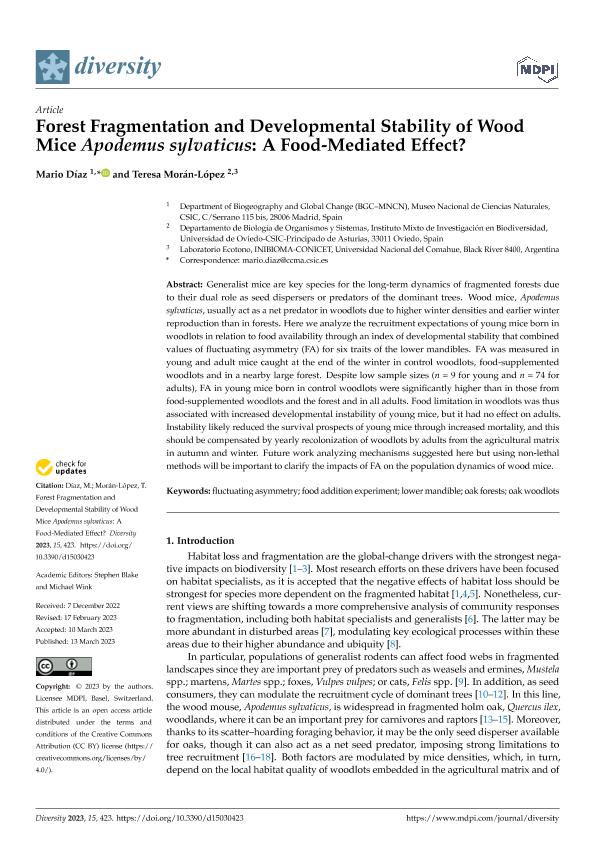Mostrar el registro sencillo del ítem
dc.contributor.author
Díaz, Mario
dc.contributor.author
Morán López, Teresa

dc.date.available
2024-03-25T12:59:32Z
dc.date.issued
2023-03
dc.identifier.citation
Díaz, Mario; Morán López, Teresa; Forest Fragmentation and Developmental Stability of Wood Mice Apodemus sylvaticus: A Food-Mediated Effect?; MDPI; Diversity; 15; 3; 3-2023; 423-445
dc.identifier.issn
1424-2818
dc.identifier.uri
http://hdl.handle.net/11336/231441
dc.description.abstract
Generalist mice are key species for the long-term dynamics of fragmented forests due to their dual role as seed dispersers or predators of the dominant trees. Wood mice, Apodemus sylvaticus, usually act as a net predator in woodlots due to higher winter densities and earlier winter reproduction than in forests. Here we analyze the recruitment expectations of young mice born in woodlots in relation to food availability through an index of developmental stability that combined values of fluctuating asymmetry (FA) for six traits of the lower mandibles. FA was measured in young and adult mice caught at the end of the winter in control woodlots, food-supplemented woodlots and in a nearby large forest. Despite low sample sizes (n = 9 for young and n = 74 for adults), FA in young mice born in control woodlots were significantly higher than in those from food-supplemented woodlots and the forest and in all adults. Food limitation in woodlots was thus associated with increased developmental instability of young mice, but it had no effect on adults. Instability likely reduced the survival prospects of young mice through increased mortality, and this should be compensated by yearly recolonization of woodlots by adults from the agricultural matrix in autumn and winter. Future work analyzing mechanisms suggested here but using non-lethal methods will be important to clarify the impacts of FA on the population dynamics of wood mice.
dc.format
application/pdf
dc.language.iso
eng
dc.publisher
MDPI
dc.rights
info:eu-repo/semantics/openAccess
dc.rights.uri
https://creativecommons.org/licenses/by/2.5/ar/
dc.subject
FLUCTUATING ASYMMETRY
dc.subject
FOOD ADDITION EXPERIMENT
dc.subject
LOWER MANDIBLE
dc.subject
OAK FORESTS
dc.subject
OAK WOODLOTS
dc.subject.classification
Ecología

dc.subject.classification
Ciencias Biológicas

dc.subject.classification
CIENCIAS NATURALES Y EXACTAS

dc.title
Forest Fragmentation and Developmental Stability of Wood Mice Apodemus sylvaticus: A Food-Mediated Effect?
dc.type
info:eu-repo/semantics/article
dc.type
info:ar-repo/semantics/artículo
dc.type
info:eu-repo/semantics/publishedVersion
dc.date.updated
2024-03-12T10:24:15Z
dc.journal.volume
15
dc.journal.number
3
dc.journal.pagination
423-445
dc.journal.pais
Suiza

dc.description.fil
Fil: Díaz, Mario. Consejo Superior de Investigaciones Científicas. Museo Nacional de Ciencias Naturales; España
dc.description.fil
Fil: Morán López, Teresa. Universidad de Oviedo; España. Consejo Nacional de Investigaciones Científicas y Técnicas. Centro Científico Tecnológico Conicet - Patagonia Norte. Instituto de Investigaciones en Biodiversidad y Medioambiente. Universidad Nacional del Comahue. Centro Regional Universidad Bariloche. Instituto de Investigaciones en Biodiversidad y Medioambiente; Argentina
dc.journal.title
Diversity
dc.relation.alternativeid
info:eu-repo/semantics/altIdentifier/doi/http://dx.doi.org/10.3390/d15030423
Archivos asociados
